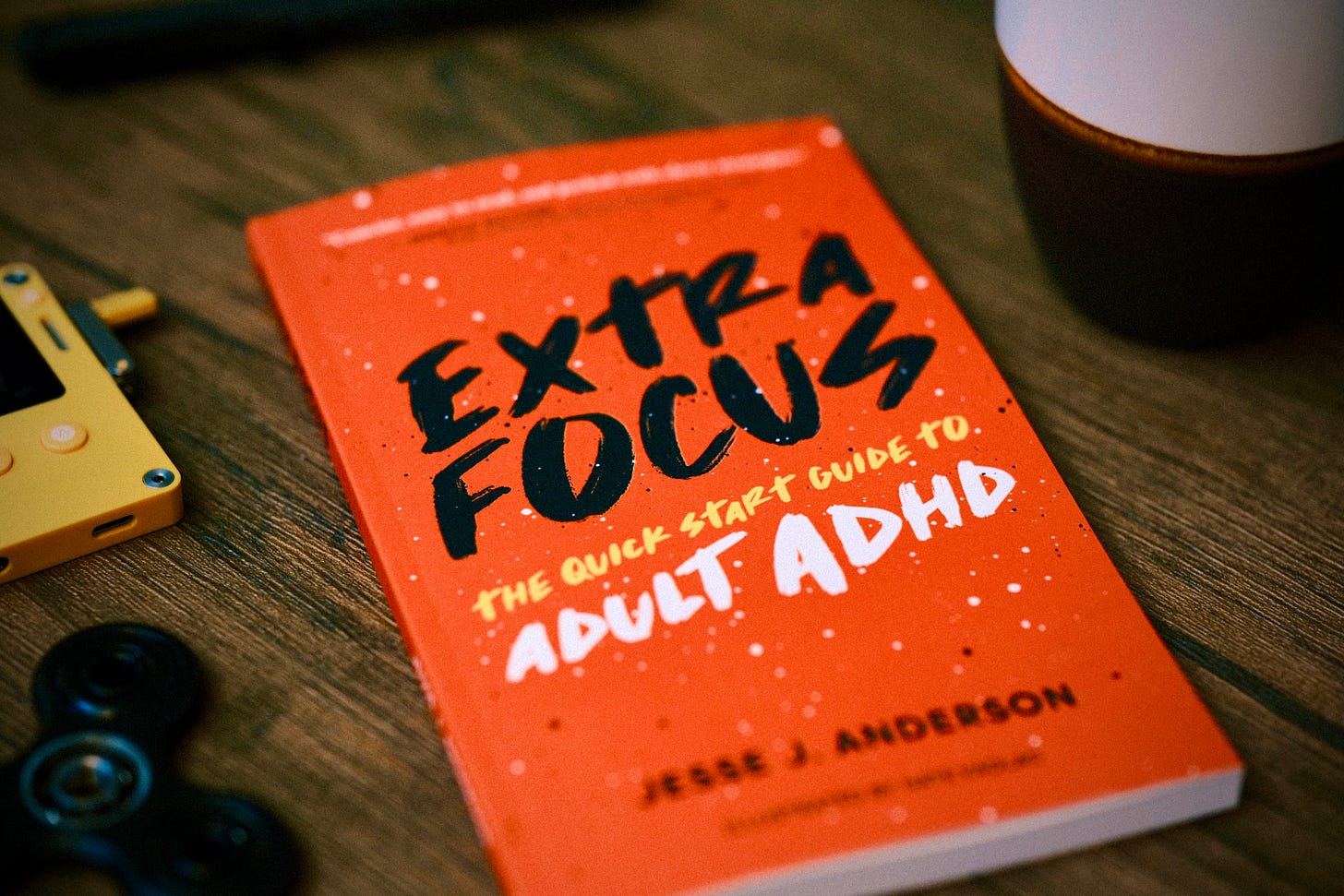Extra Focus: an ADHD Journey
Hi friend!
Long time, no see. I hope your summer passed without too many troubles and that your excited about fall!
One of the things I've been doing this year is allow myself to read more. Recently, I've let my natural curiosity lead me to more nonfiction subjects that interest me, and surprise, surprise, a lot of the nonfiction books have been about ADHD.
I've mentioned my ADHD very casually here before, and I talk about it pretty openly IRL, but I realize I've never really fully written about my experience before, either.
Since my formal diagnosis two years ago, there's still a thirst for knowledge for how it all works, how I work. The truth is that I'm still getting used to living with the reality that my brain actually does work differently, and that all those years of a vague feeling of "I think I work differently than what is expected of me" wasn't actually a hoax. I'm still coming to terms with it all and I'm slowly uncovering blind spots that have all slowly revealed themselves to be ADHD symptoms over the last few years.
But all of these revelations have been possible because other people have been talking about their own experiences with ADHD and how differently it might represent itself based on different experiences.
One of those people has been Jesse J. Anderson, the creator of the Extra Focus newsletter. Jesse is a delightful fellow Substack writer who writes weekly newsletters about his ADHD experience. What drew me to his writing was his candid view of his own struggles with ADHD and interfacing with a world not designed for neurodivergence.
His posts have been really good weekly doses of reminders that I'm not actually alone in my own struggles. It's been especially validating to read about how those of us with ADHD have very different, varied interests, so of course, our life trajectories look a lot different than most of our neurotypical peers.
Then a few weeks ago, Jesse broke the best news: he'd basically summing up all of his experiences as someone who was diagnosed with ADHD as an adult into a book called Extra Focus: The Quick Start Guide to Adult.
And that book comes out today!
I had the chance to read an ARC of the book provided by Jesse in exchange for an honest review. My big disclaimer here is that I am absolutely getting nothing out of talking about this book besides the pure joy that it finally exists, and I get to talk about it and share it with others.
So here is my very honest review: I really, really wish I could take this book back to 2021-Yasi and say, "It's really all going to be okay, but start here."
After being diagnosed, I spent about an entire year madly researching ADHD. I especially wanted to know if there were other strategies that would be supplemental to just taking medication. I've been fortunate enough to find the right medication that works for me, but it wasn't a silver bullet. It was the beginning of me finally getting the help I needed, and while it was sorely needed, it was by no means the end.
Extra Focus: The Quick Start Guide to Adult is the exact supplemental guide I was looking for. It's written as a reference book, with different sections focusing on different struggles of ADHD, while clearly outlining a few broad-stroke strategies. I read these as launchpads: places where a newly diagnosed person might start and then tweak said strategies to their situation and hone them to fit their needs.
One of the very fun (not) parts of ADHD is how overwhelming information can be. It's really obvious that Jesse was mindful of this when writing the book because Extra Focus is written for people who struggle with both finding, organizing, and retaining information. In that sense, it's written very accessibly. Chapters and sections are concise and digestible, without leaving off any important information.
Extra Focus has immense value for someone who has just been diagnosed, but it also resonates for those who have already spent a lot of time in the ADHD community and keep up with its latest developments. Jesse has a way of presenting already-known problems in a different light.
One of the examples that especially stood out to me was the chapter called Time.
Most of us with ADHD struggle with time blindness -- i.e. not being able to conceptualize time. In Extra Focus, Jesse's advice is to turn Waiting Mode, that stretch of time between the now and a timed event in the future, into Thinking Mode. This really changed how I approach my time spent waiting for appointments, waiting in line, waiting at the dentist's office, etc. I've realized that these are actually the best times for me to challenge myself to do something different. Maybe I challenge myself to write a hundred words, or to finish reading a chapter of a book, or generally spend some precious percolation time brainstorming ideas for a story. And since trying this slight tweak, I've noticed that I've felt less frustrated about my general issues with time.
This is but one example of how neurodivergence can actually be a strength at times. Though this has been a school of thought that's been gaining momentum over the last decade or two, Jesse does a fantastic job applying that concept pragmatically, by showing exactly how the "shortcomings" of an ADHD brain can actually turn into an advantage.
With all that said, are you planning on reading Extra Focus? If so, drop me a line and tell me what you think!
Much love,
Yasi


